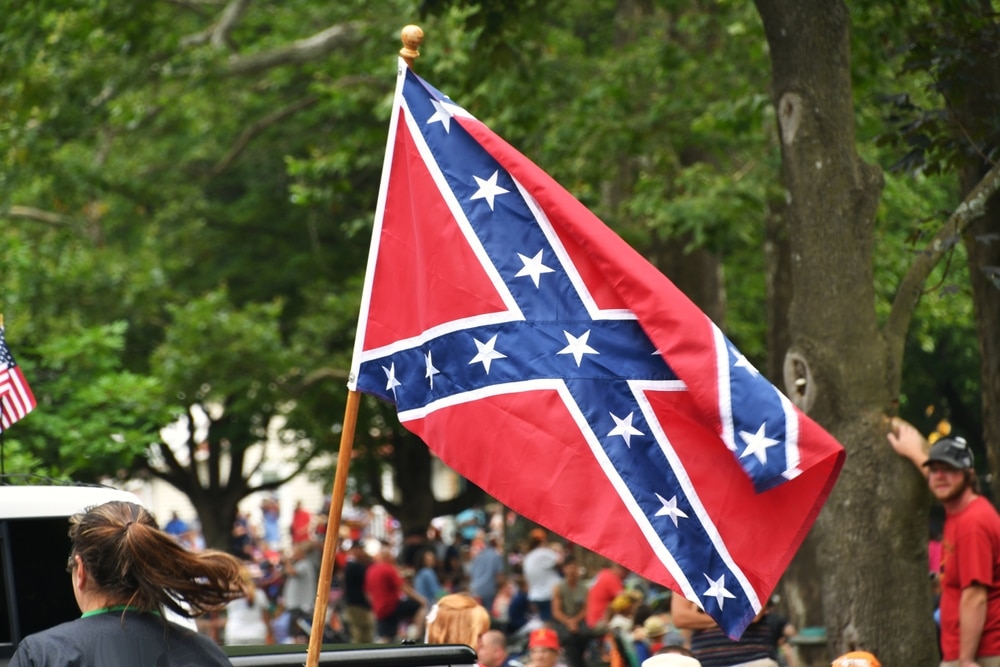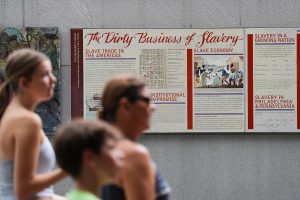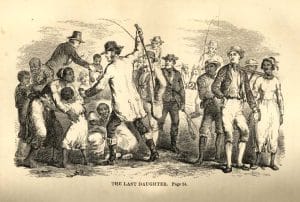“[I]nvoking the favor and guidance of Almighty God,” the Constitution of the Confederate States of America composed by southern slaveholders in 1861 sought to “establish justice, insure domestic tranquility, and secure the blessings of liberty to ourselves and our posterity.” The authors of Project 2025, the latest playbook for restructuring the federal government in order to accomplish the policy goals of Christian Nationalists, similarly declare their manifesto will “decide America’s future” by securing their “God-given individual rights to live freely” and exercise dominion over others.
Many Confederate states issued formal statements explaining slaveowners’ decision to secede from the United States of America, a decision openly rooted in a cultural construct of white supremacy and Black slavery. Georgia’s “Declaration of Causes for Secession” pinned blame on the “hostile” anti-slavery convictions of the Lincoln administration. “Our position is thoroughly identified with the institution of slavery,” Mississippi’s slaveholders declared, dismissing as ungodly the “hostility” of many white northerners advocating for “negro equality, socially and politically.”
Like the ideology of the Confederate States, Christian Nationalists’ Project 2025 advocates for “ordered liberty,” a phrase referring to the protection of public safety and defense of traditional rule of law. In the slaveocratic South, public safety and rule of law meant the forced and policed enslavement of Black persons to protect the physical safety and financial interests of whites.
A political philosophy that ultimately subsumes individual constitutional rights to maintain a tiered cultural and social order, “ordered liberty” in various modern court cases has been challenged by advances in human rights. When the U.S. Supreme Court angered Christian Nationalists in 2015 by ruling 5-4 in the Obergefell v. Hodges case, Chief Justice John Roberts wrote in dissent that the court had erred by establishing civil rights that were not “deeply rooted in our Nation’s history and traditions” and were not “implicit in the concept of ordered liberty.”
Pushing back on human equality and progressive education, Project 2025 is committed to returning to traditional ordered liberty by abolishing the “woke agenda” of acknowledging systemic racial inequalities, and by suppressing the “highly educated” and returning to power “the humble, patriotic working families” whom “elites” allegedly despise. Yet billionaires rather than common folk fund Project 2025’s opposition to fair corporate taxes, effective business regulations, abortion, women’s rights, human rights, public schools, robust Social Security and welfare programs and adequately funded public health programs — all of which benefit working families.
Although holding aloft their agenda as an outgrowth of Reaganism, Project 2025’s authors in reality parrot ideology of 1950s and ’60s Confederate apologists. Angered by racial integration of public schools and other advances toward equality for Black Americans, many whites in the South during the Civil Rights-era pushed back, often flying Confederate flags. Some counties shuttered their public schools rather than have white children sit alongside Black children. In many cases, white parents established church-based, whites-only private segregation academies, the beginnings of the modern Christian school and private school voucher movements which infuse Project 2025’s education agenda.
Project 2025’s opposition to human rights is effectively an extension of Civil Rights-era opposition within which a group of extremist Christian educators drinking from the well of Confederate pro-slavery theologians crafted a plan for returning America to pre-Brown v. Board ordered liberty. Their plan: minimize the influence of the federal government, while empowering Bible-educated white Christian families to fill the gap.
Republishing pro-slavery works of prominent Confederate Presbyterian ministers such as Robert Lewis Dabney, James Henley Thornwell and Benjamin Morgan Palmer, those anti-human rights educators pushed for the formation of a far-right Presbyterian denomination to succeed the long-defunct Presbyterian Church in the Confederate States of America. Although their denominational efforts did not reach full fruition, by the late 1960s one of the educators — R.J. Rushdoony — crafting a “biblical worldview” effectively drawn from Confederate Christian orthodoxy, found a more receptive and much larger audience among resentful white Christians at large angered over the Civil Rights movement.
Federal law was wrongfully being “used as an ostensible weapon to gain equality,” Rushdoony declared. God’s law properly ordered human affairs. In his book Institutes of Biblical Law, he wrote “at all times, the law defines, in any and every society, those who constitute the legitimate and the illegitimate members of society,” his words evoking ordered liberty. In the United States the Bible should be the moral, social and cultural law, Rushdoony taught, echoing enslavers of old who used the Bible to defend the enslavement of Black persons in a racially ordered society.
INTERVIEW: Robert P. Jones Exposes the Disturbing Links Between Christian Nationalism and White Supremacy
“Because education means the training of the generations to come in the basic values, goals, and standards of a society, control of education is a central key to power,” Rushdoony wrote in his book The Philosophy of Christian Education. “To control the future requires the control of education and of the child. Hence, for Christians to tolerate statist education, or to allow their children to be trained thereby, means to renounce power in society, to renounce their children, and to deny Christ’s lordship over all of life.”
Rushdoony effectively advocated for a theocracy. “There can be no tolerance in a law-system for another religion [other than Christianity],” he insisted in Institutes.
Rushdoony’s criticism of human rights reflected the ideology of the Confederate States’ vice president Alexander Stephens. In his Cornerstone Speech of March 21, 1861, in Savannah, Ga., Stephens extolled the biblical virtues of inequality. “Our new government is founded upon exactly the opposite idea [of human equality]; its foundations are laid, its cornerstone rests upon the great truth, that the negro is not equal to the white man; that slavery — subordination to the superior race — is his natural and normal condition.” Northern advocates of Black equality were suffering “from a defect in reasoning … a species of insanity” in “attempting to make things equal which the Creator had made unequal.”
Rushdoony’s “Reconstruction” project — the reconstructing of society away from modern inclusive democracy and backward toward an antebellum-oriented, white-privileged, family-centric, theocratic-like state — eventually gave way to what is now known as Dominionism. An overarching Christian Nationalist theocratic vision of the future, Dominionism demands that all perceived major spheres of human existence — family, religion, education, media, arts & entertainment, business and government — must be brought under the rule of God. This “Seven Mountain Mandate” reflects Rushdoony’s teachings of family, culture and law grounded upon the Bible and religious education and displacing the authority of the federal government.
Project 2025, in similar fashion, is rooted in Christian Nationalists’ Dominionist game plan of reconstructing the structural foundations of the United States.
From slaveholding theologians to Alexander Stephens to Confederate-infused R. J. Rushdoony to Dominionism and Project 2025, the war against human rights and equality has now reached existential proportions. The equating of “radical social policies” to “human rights priorities … undermines actual human rights,” Project 2025 proclaims, twisted words echoing the twisted ideology of the Confederate States of America.
In addition to Confederate roots, Project 2025 also reconstructs the U.S. Constitution. In the name of their superior “religious liberty,” document authors contort the Establishment Clause of the First Amendment to demand the prohibition of government “abortion travel funding” and the defunding of Planned Parenthood.
READ: Rep. Brian Fitzpatrick Wants to Change the US Constitution and Radically Transform the Country
The end goal of Project 2025 is religious privilege and power. “When the Founders spoke of ‘pursuit of Happiness,’ what they meant might be understood today as in essence ‘pursuit of Blessedness,” the document’s authors insist, with no evidence to back up their claim. “That is, an individual must be free to live as his Creator ordained — to flourish. Our Constitution grants each of us the liberty to do not what we want, but what we ought,” the theocratic blueprint declares, making the Constitution say something that it does not actually say and denying pregnant people the right to control their own bodies.
The “pursuit of the good life is found primarily in family — marriage, children, Thanksgiving dinners, and the like … Religious devotion and spirituality are the greatest sources of happiness,” Project 2025 continues, demanding a theocratic future of religious-based, white male-dominant ordered liberty and structural inequality within which God’s self-perceived chosen people rule over all others.
This article was originally published in the July/August 2024 issue of Church & State magazine, a project of Americans United for Separation of Church and State. It is reprinted here with permission.






